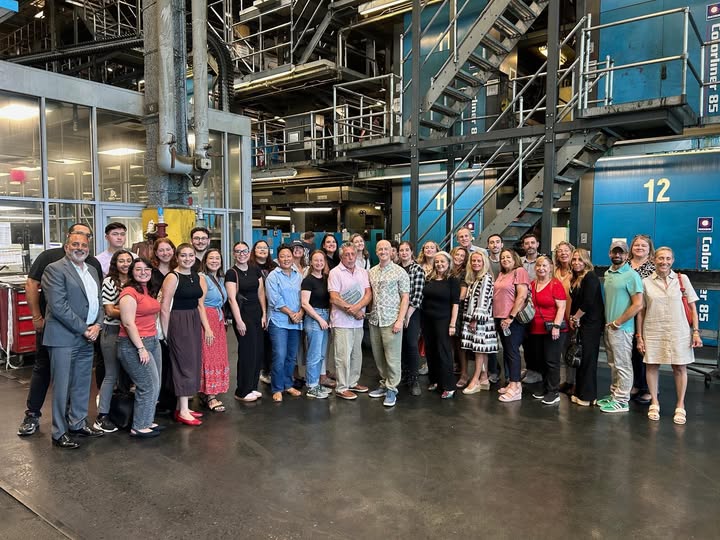Why Having An Editor Rip Apart Your Writing Is a Blessing In Disguise
My first ever post on Phillymag.com wasn’t really mine. Sure, it had my byline and the artwork I created for it, but not one single word that was written flowed from my brain onto the screen. But before you go thinking I’m a total fraud, let me explain.
I wrote up my first post for the popular city online publication with a joyful little smile on my face. It was about Alexa Chung’s up-and-coming denim line launching in a Philly store. Of course, I couldn’t even afford a button from the Alexa Chung line (Seriously, who pays $110 for a t-shirt?) and I’ve never even heard of the store it was being featured at, but I gave it a go. I quickly sent it over to my editor and totally did a happy dance in my cubicle.
I get a message from her. “Rebecca, want to come over to my office so we can edit this together?” Writing was always my strong suit, so I absurdly thought she would simply praise my work and tell me I’m off to a great start.
Oh, god, was I wrong. By the time I walked in her office (which takes about four seconds on a bad day), she was already going in on my article. My heart dropped into my stomach. Maybe I wasn’t going to be good at this, after all. She swiftly made her way through the three paragraph piece; snipping here, changing words there, and deleting entire sections all together. Finally she pushed the “Publish” button, but I felt the strangest urge to cry (or a flip a table, whichever).
But, luckily for me (and the tables of the office, I suppose) I quickly realized three things:
1. It wasn’t personal.
2. She only wants the best for the website (which is totally fair).
3. She only wants the best for me.
It was easy to take it personally when she edited my every word, easy to feel like a complete failure. Easy to feel complete discouragement. But it was actually the complete opposite. A few days went by of her meticulously editing my pieces, and soon she only had to change a few words here and there or delete a comma. She was building up my confidence in writing, teaching me how to handle lengthy pieces, guiding me to efficient and streamlined writing, and ultimately making me a better writer in all. I would study her edits and store them away in a folder in my brain labeled “So You Can Do Better Next Time”. I often reference that mental folder now while writing posts. In the four short months I’ve been here, I’ve gone from having every word changed, to full pieces that are not only entirely mine, but that generate a lot of buzz on the website.
Although I don’t plan on remaining in the editorial world postgrad, my copywriting skills have improved tenfold if nothing else. In my Intro to Copywriting class, I remember my professor giving me falsely approving nods on copy that we both knew was terrible. (Joe Glennon, what a trooper.) But now, as I’m knee-deep in his advanced copy class, I can see that – although still not ready to embark on a copywriting career – I’m improving. I’d like to think his expert teaching abilities are the sole reason for the improvement (although I’m sure it plays a much larger part than I’m aware of), but a lot of my honed skills have to do with me trying to fit an entire story into a six-word headline to publish on a post. It’s a lot harder than you might think. Seriously. It’s awful. But I didn’t magically learn how to do that on my own. I learned from having someone (whether it be my editor or my professor) completely rip apart my stories or idea. I learned from failure. And if you ask me, that’s the best way to learn: Once you’ve failed, you’re less scared to fail again. You move beyond yourself and your fear of falling. You make progress. And after all, progress just looks like a bunch of a failures.







I can relate to everything you’re saying here Rebecca. Although, I’m interning at a social media marketing company, which means writing much, much shorter copy than in the editorial world. Even so, I know the struggle of nailing that perfect headline, and having my work torn apart by an editor. On the bright side, I’ve found that my initial failures made the later success more rewarding. Good luck with the rest of your internship!
It’s awesome to see such a positive outlook on this experience, Rebecca. While it didn’t happen with my current internship, I can still remember back to my first one when my supervisor absolutely tore apart everything I had written — with a red pen! Just like you, this experience motivated me to really understand my writing on a different level and really get behind the emotion and tone of the piece. I’ll leave you with something a former boss had told me. He said: “If it doesn’t work, get rid of it” While it doesn’t mean you should just get lazy and scrap something right away, it helps to know that there is a time to start fresh with your writing and really find what works best for the piece. Best of luck with the rest of your internship!
I’m glad to hear that you were able to learn from the experience and not become discouraged by it. As I begin my internship, as well as a few freelance projects, I submitted my initial work with confidence and was surprised to see some of it returned with numerous edits. After being exposed to it, I hope you are able to realize that it is not personal. I have worked with and met people that too often do. As you mentioned, the supervisor has to keep the best interest of the client / publication in mind and occasionally, our first offerings are not what they had hoped for. It gets easier the more you do and it sounds like you have the right outlook. Best of luck as you continue on writing.